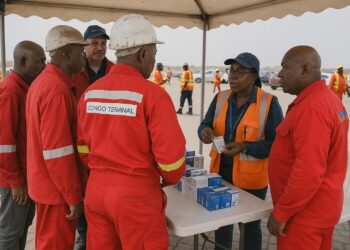Belgian Firms Scout Congolese Growth
Eighteen Belgian companies landed in Brazzaville on 13 October, launching a five-day economic mission designed to translate exploratory talks into concrete projects across the Republic of Congo. The delegation’s tight agenda reflects growing European appetite for Central African growth stories.
The visit opened with a round-table bringing Congolese investors face to face with their Belgian counterparts. Organisers structured the discussion around three thematic pillars to help each foreign firm map its capability against local demand and to shorten the usual market-entry learning curve.
Congo’s Sector Potential in Focus
Under the headline ‘Republic of Congo and business opportunities’, Michel Djombo, president of the national employers’ union, and Henry René Diouf, deputy representative of UNDP, painted a macro snapshot. Their message was unequivocal: diversified potential exists well beyond the country’s mature hydrocarbon base.
Agriculture, forestry, fisheries, public works and downstream petroleum processing were cited as priority playfields, with speakers stressing abundant arable land, strategic river and port corridors and a young labour pool. For CEOs accustomed to saturated European markets, those fundamentals signal room to scale efficiently.
Construction Boom and EU Expertise
The second pillar focused on construction. Federica Petrucci, deputy head of cooperation at the European Union delegation, observed that Congo’s pipeline of roads, bridges, social housing and logistics hubs is expanding in step with urbanisation. She underlined compliance, safety and green-building know-how as areas welcoming foreign expertise.
Petrucci noted, “European contractors add value where project governance demands transparent standards and lifecycle costing.” Her intervention resonated with Congolese developers seeking to blend cost control with international benchmarks as a way to attract blended finance from multilateral and private sources.
Private Sector Role in Infrastructure
The third theme addressed infrastructure governance under the title ‘Challenges and prospects: what place for the private sector?’. Speakers argued that sustainable delivery hinges on entrepreneurial participation across feasibility, engineering, operation and maintenance, not solely on public-sector procurement cycles.
By inviting the Belgian cohort to embed early in project preparation, organisers aimed to increase bankability rates and accelerate time to financial close. Such positioning aligns with Congo’s objective to shift capital expenditure from state balance sheets toward diversified public-private partnerships.
Deal Making and Early Agreements
After the plenary, one-to-one matchmaking sessions filled meeting rooms in Brazzaville’s business district. According to participants, discussions ranged from horticultural supply chains to modular bridge technology, reflecting the diverse profiles inside the mission, which includes engineering consultancies, agro-exporters and equipment suppliers.
Several memoranda of understanding were initialled the same afternoon, although financial terms remain confidential. Delegates characterised the documents as ‘pathfinders’ that outline scope, timelines and governance principles before fuller due diligence delivers binding contracts.
Congolese investors emphasised reciprocity, highlighting local content rules and skills-transfer clauses that now accompany most concession frameworks. Belgian managers acknowledged the requirement, noting that long-term competitiveness depends on mobilising domestic supply chains and training programmes rather than relying exclusively on imported labour.
Diplomatic Architecture Behind the Mission
Diplomatic backing plays a quiet yet decisive role. The mission is co-organised by the Belgian embassy in Brazzaville and the Congolese embassy in Brussels, alongside the Brazzaville and Pointe-Noire chambers of commerce and the Union patronale et interprofessionnelle du Congo.
This coalition ensures that any regulatory bottlenecks flagged during business-to-business meetings receive rapid escalation to the appropriate ministries. It also signals to financiers that host-country authorities endorse the pipeline of projects emerging from the dialogues.
Strategic Implications for Both Economies
For Congo, diversifying its investor base beyond traditional Asian and French partnerships reduces concentration risk and widens access to European innovation. For Belgium, whose export credit agency actively supports frontier markets, the trip translates geopolitical goodwill into measurable corporate turnover.
Industry observers present in the room argued that timing is favourable. Oil prices provide fiscal space for infrastructure commitments, while global supply-chain realignment pushes manufacturers to scout nearer redundant capacity. Belgian medium-sized firms, nimble by design, can plug into that momentum quickly.
Nonetheless, speakers counselled patience. Djombo reminded attendees that due diligence in Congo must account for climatic, logistical and administrative variables that differ markedly between the capital, coastal Pointe-Noire and the northern agricultural basins. Sequencing site visits accordingly will prevent cost overruns.
Diouf added that alignment with the national development plan remains crucial. He urged foreign partners to reference government priority lists when structuring proposals, thereby accelerating permitting and unlocking concessional co-financing lines managed by multilateral agencies.
Pointe-Noire Leg to Consolidate Momentum
Participants will reconvene in Pointe-Noire before flying back to Europe on 17 October. Organisers expect the coastal leg to deepen maritime logistics discussions, given the city’s role as oil hub and gateway for regional trade corridors linking Central Africa to Atlantic markets.
As first impressions crystallise into pilot projects, both sides describe the encounter as a practical step toward a broader, mutually reinforcing economic corridor. Follow-up committees will track progress, ensuring that early goodwill matures into jobs, technology transfer and sustainable revenue streams for Congo.











































